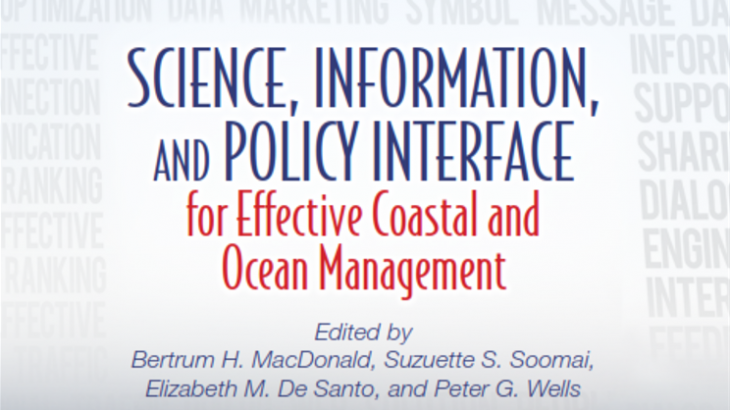Bertrum MacDonald, research lead for the Environmental Information: Use and Influence (EIUI) research program, has been appointed Visiting Researcher by the International Ocean Institute-Canada (IOI-Canada) for 2016-2017. Dr. MacDonald, who recently concluded a term as Dean of the Faculty of Management at Dalhousie and is on a year-long research leave, will continue his line of […]
Science-Policy Interface
EIUI Book Chapter Post: The Science-Policy Interface in Coastal and Ocean Management: Background and Characteristics
“The Science-Policy Interface in Coastal and Ocean Management” is a series of posts highlighting the chapters in the new book: Science, Information, and Policy Interface for Effective Coastal and Ocean Management, edited by Bertrum H. MacDonald, Suzuette S. Soomai, Elizabeth M. De Santo, and Peter G. Wells, published by CRC Press (Taylor & Francis). Science, […]
EIUI Team Member Raises Questions about the Practice of Establishing Remote Very Large Marine Protected Areas
In a recent viewpoint paper in Marine Policy, EIUI team member, Elizabeth De Santo, and Peter Jones argue that “recent increases in the designation of remote, very large marine protected areas (VLMPAs) around the world threaten to undermine the very purpose and objectives of the Aichi biodiversity targets they are aiming to address.” In brief, […]
EIUI Research Team Participates in New Ocean Frontier Institute
The Canadian federal government announced a major new research grant on Tuesday, 6 September 2016, that will support the work of the new Ocean Frontier Institute at Dalhousie University. Scott Brison, President of the Treasury Board, confirmed that the government has approved Dalhousie’s application to the Canada First Research Excellence Fund for $93.7 million. […]
EIUI Launches Important New Book
The EIUI research team launched the new volume, Science, Information, and Policy Interface for Effective Coastal and Ocean Management, on 6 June 2016 at Dalhousie University. Edited by Bertrum H. MacDonald, Suzuette S. Soomai, Elizabeth M. De Santo, and Peter G. Wells, this timely volume was published by CRC Press (division of Taylor & Francis). […]
Improving Use of Research-Based Information in Policy Contexts
Today, governments are expected to promote the use of research in practice settings. Evidence-based practice is viewed as the goal of public services in many developed nations (Nutley, Walter & Davies, 2007). In addition, governments also give attention to use of research-based information in their policy making processes. Developed nations have employed a range of […]
The Research-Policy Interface: Models, Frames, and Affecting Factors
To ensure an optimal evidence-based decision making process, it is essential to have an understanding of the research-policy interface and to be able to measure the effectiveness of the use and influence of research on policy. Different models for conceptualizing the research-policy interface have emerged over the past several decades and have, increasingly, accepted the […]
Managing the Communication of Research Information for Policy: Institutional Dynamics and the Social Component
Effective communication is a popular phrase within many institutions. At a basic level, communication involves purposeful exchange of information among parties. Failure to successfully transfer knowledge within this transaction can result in misunderstanding, misuse of time, and inappropriate or lack of action. Within a governmental context, this situation could result in wasted resources, ineffective policy, […]
Information Flow Frameworks: Communication of Research-Based Information into Policy
The demand for usable scientific information is increasing along with a greater need to understand how research-based information flows in pathways into both policy and practice settings. Yet, a number of issues with respect to the pathways, through which information is obtained, can impede the use of research in decision-making. The literature on this subject […]
New EIUI Book about the Science-Policy Interface to be Published in May 2016

The EIUI Research team is very pleased to announce that Science, Information, and Policy Interface for Effective Coastal and Ocean Management will be published by CRC Press (division of Taylor & Francis) on 16 May 2016. This volume, edited by Bertrum H. MacDonald, Suzuette S. Soomai, Elizabeth M. De Santo, and Peter G. Wells, brings […]